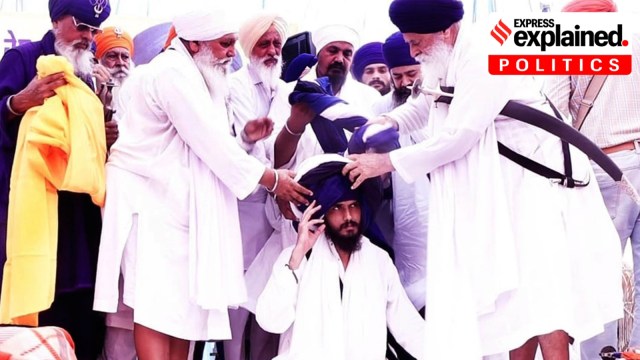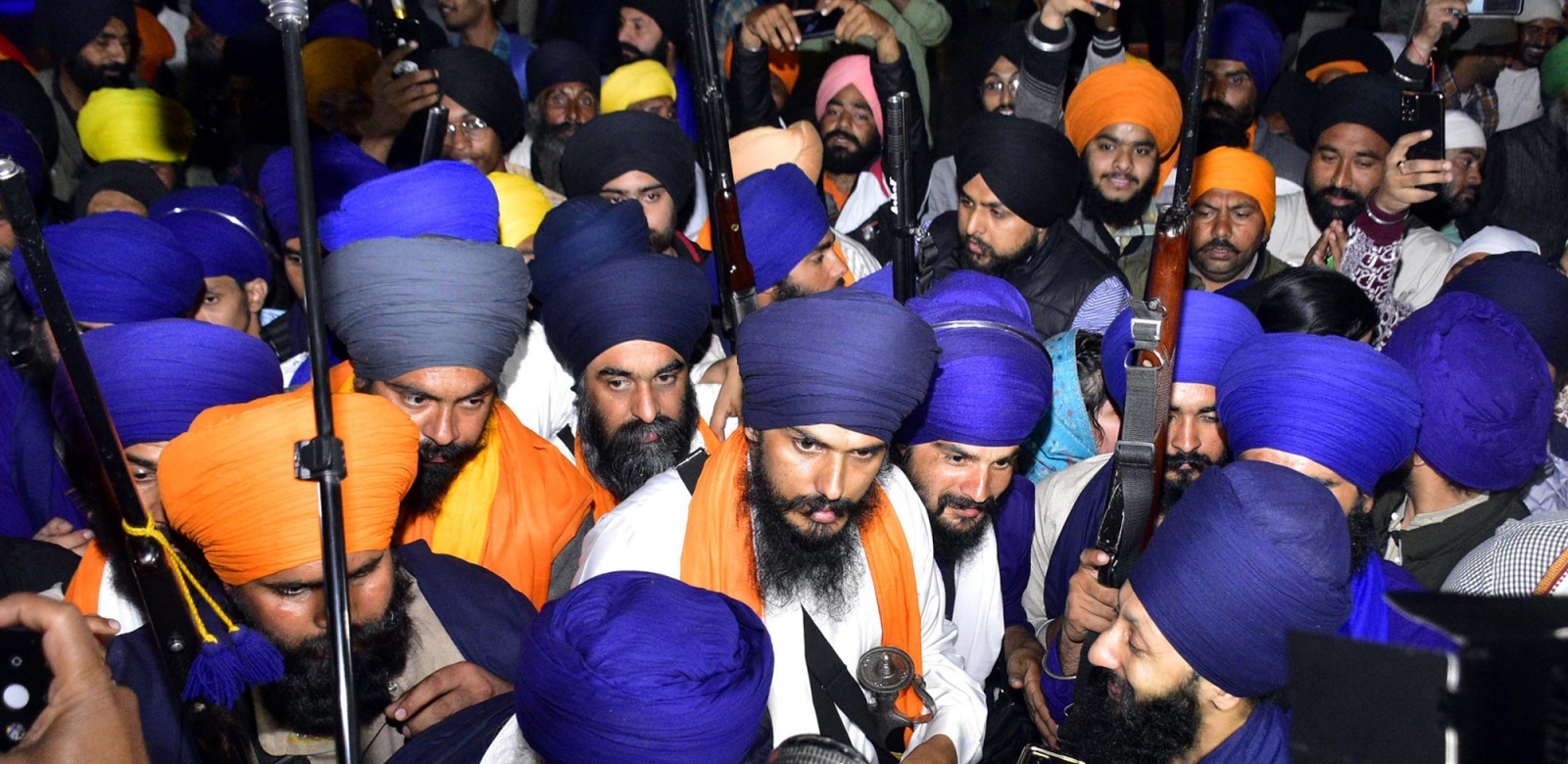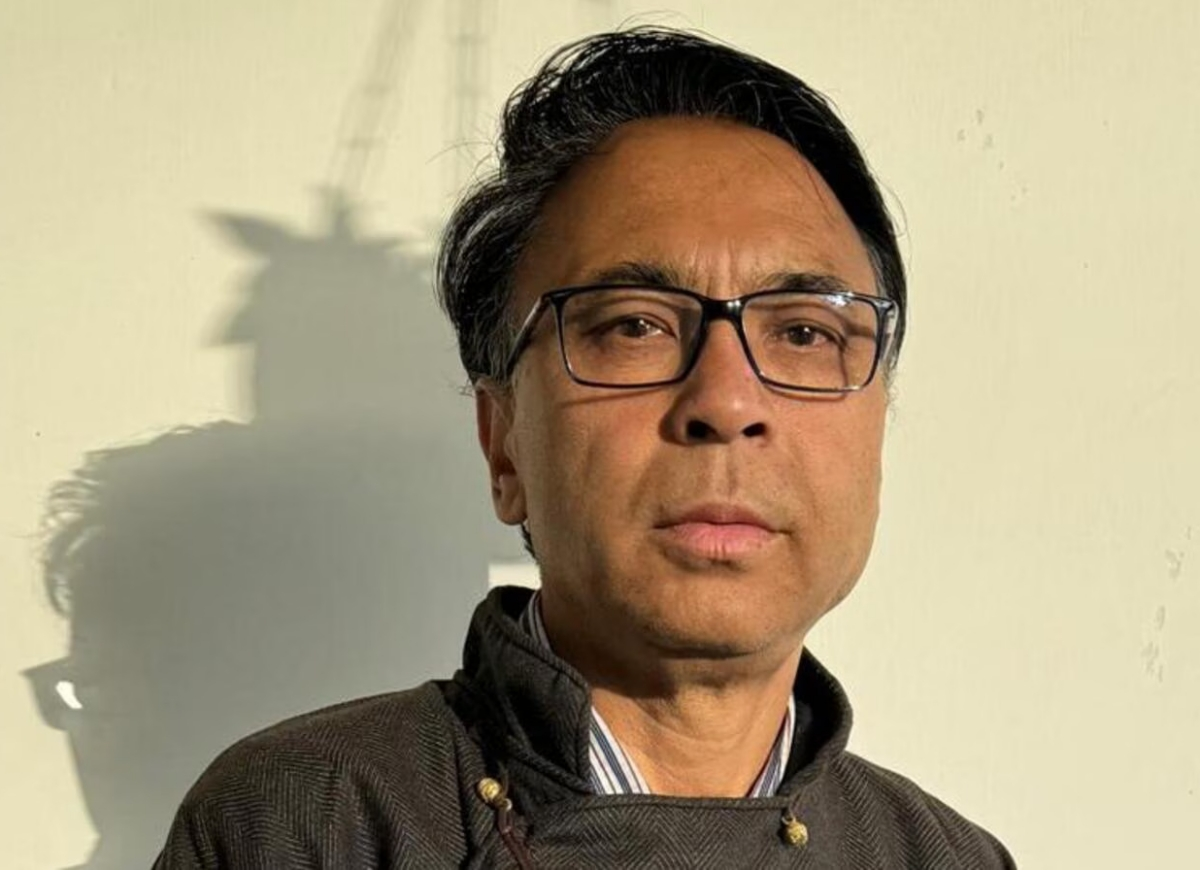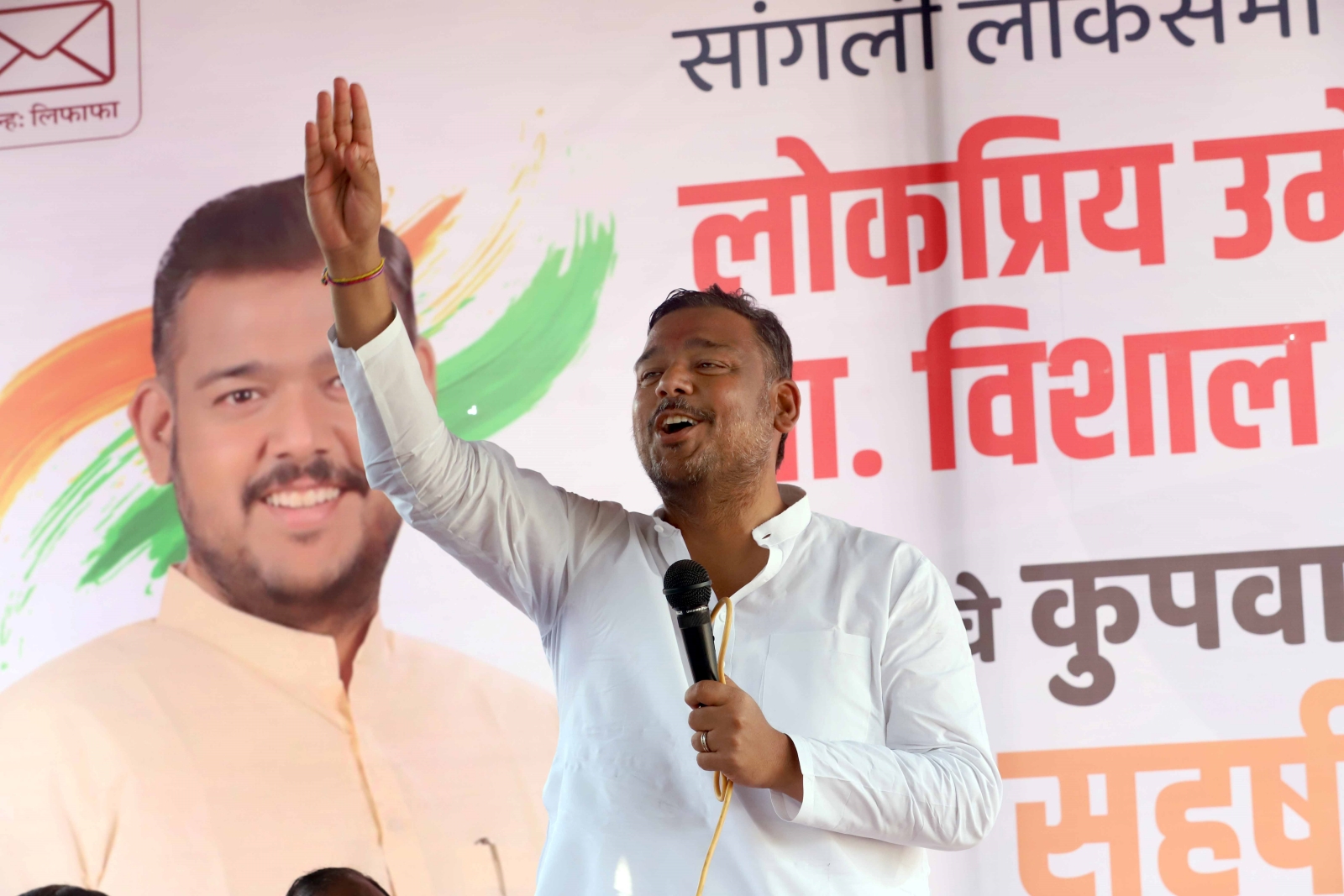© The Indian Express Pvt Ltd
Latest Comment
Post Comment
Read Comments
 Baptism ceremony of Amritpal Singh at Bhindranwale's village Rode in Moga.. Express Archive Photo Gurmeet Singh *** Local Caption *** Baptism ceremony of Amritpal Singh at Bhindranwale's village Rode in Moga.. Express archive photo by Gurmeet Singh
Baptism ceremony of Amritpal Singh at Bhindranwale's village Rode in Moga.. Express Archive Photo Gurmeet Singh *** Local Caption *** Baptism ceremony of Amritpal Singh at Bhindranwale's village Rode in Moga.. Express archive photo by Gurmeet Singh(Written by Uday Srivastava and Saima Mehta)
Seven of the newly-elected Lok Sabha’s 543 members are independents, who defeated candidates from established political parties to enter the House. These include people who were once a part of a major party but fell out, candidates who contested from prison, and grassroots leaders.
Here are their profiles.
 Amritpal Singh. Express Archive
Amritpal Singh. Express Archive
Votes Secured: 4,04,430
Margin: 1,97,120
Runner-up: Kulbir Singh Zira (INC)
Amritpal Singh was one of two candidates to have contested, and won, the Lok Sabha elections from prison. He is currently jailed in Dibrugarh, Assam under the National Security Act (NSA) for his pro-Khalistan activism.
A clever strategist, Amritpal has built his political career in a short span of time by exploiting the socio-economic landscape of Punjab. Hailing from a well-to-do construction family, he returned from Dubai in 2022, as Punjab simmered in the aftermath of the farmers’ protests.
He took over Deep Sidhu’s Waris Punjab De, an organisation born out of the protests “to fight for the rights of Punjabis,” specifically Sikhs. Amritpal started sporting a turban and grew his beard, and fashioned himself after Khalistani separatist Jarnail Singh Bhinderwale, delivering pro-Khalistani rhetoric laced with comments on pressing local issues such as unemployment and substance abuse.
Amritpal became a cult hero when he and his followers stormed a police station near Amritsar to free some associates. This was followed by an intense manhunt by the Punjab police and central agencies — which only added to his popularity. He was finally arrested in April 2023, and has been in prison since.
He announced his candidacy for the Lok Sabha elections in April. His campaign, run by his parents and loyal core of supporters, focused on tackling substance abuse and unemployment, but toned down his radical rhetoric, which might have alienated some. His anti-substance abuse message and commitment to “Sikh values” helped him stand out against his Congress opponent, Kulbir Singh Zira, who was mired in allegations of liquor extortion.
 Umeshbhai Patel (centre). File
Umeshbhai Patel (centre). File
Votes Secured: 42,523
Margin: 6,225
Runner-up: Lalubhai Babubhai Patel (BJP)
Umesh Patel defeated three-time BJP MP Lalu Patel in the Union Territory surrounded by Gujarat. A grassroots leader, Umesh is known for his strong connection to the people of D&D, cultivating trust through rigorous door-to-door campaigns. This allowed him to gain a deep understanding of local issues, and implement localised governance strategy, as well as position him as a people’s person.
“Umeshbhai was all alone campaigning door-to-door. He was always on the road, taking up issues like the rise in the property taxes in the Daman municipality and district panchayats, the rise in power tariffs and privatisation of power, and [unpopular] demolition drives... There was no star campaigner with him, two to three friends accompanied him. His wife and daughter also joined us during the campaign,” a close friend told The Indian Express.
A political science graduate from Mumbai University, Umesh has spent years as a social worker in the territory, working on a host of community projects. He runs the NGO Daman Youth Action Force (DYAF), and has been vociferous against the “dictatorial decisions taken by the administrator of Daman and Diu, and Dadra and Nagar Haveli”. In 2017, he was arrested due to his protests against the Gujarat High Court’s order to merge D&D with its neighbouring state. He also runs a school.
Umesh Patel’s localised development manifesto, in comparison to the BJP’s more industrial-oriented vision, propelled him to victory.
 Mohammad Haneefa. File
Mohammad Haneefa. File
Votes Secured: 65,259
Margin: 37,397
Runner-up: Tsering Namgyal (INC)
Mohammad Haneefa, a National Conference (NC) veteran, contested as an independent in the Lok Sabha elections after his party decided to support the Congress candidate, Tsering Namgyal, in Ladakh. Haneefa believed that Namgyal, who is from Leh, did not represent the interests of Kargil’s Shia community, and thus resigned from NC and ran as an independent.
Free from national aspirations, his agenda focused solely on advocating for local autonomy, ensuring sustainable development, and securing safeguards for Ladakh’s cultural and environmental heritage. He ran his campaign on pressing local issues such as unemployment, land rights, and infrastructure, rather than larger national questions.
He rode to victory on the back of the Buddhist vote in the district getting split between the BJP and Congress candidates, and both the Congress and NC units in the Kargil rebelling in his favour. Observers say that Haneefa’s victory reflects the yearning within Kargil for greater political representation, after MPs in the two previous terms coming from Leh.
“One of the reasons representation from Kargil is important this time is because Kargil’s grievances for over a decade have not been given a hearing in Parliament. Whether it is our border issues, education, or closure of roads, it is not discussed anywhere,” Sajjad Kargili, a political activist from Kargil who withdrew his nomination to support Haneefa, had told The Indian Express in May.
 Pappu Yadav. (PTI Photo)
Pappu Yadav. (PTI Photo)
Votes Secured: 5,67,556
Margin: 23,847
Runner-up: Santosh Kumar Kushwaha (JD-U)
Rajesh Ranjan, popularly known as Pappu Yadav, has long been one of Bihar’s biggest political mavericks. Over the years, he has been associated with various parties, Lalu Prasad’s RJD and Ram vilas Paswan’s LJP, as well as Mulayam Singh Yadav’s Samajwadi Party. He also formed his own party, the Jan Adhikar Party, in 2015 which he merged with the Congress in the leadup to the 2024 polls.
Pappu Yadav had hoped that his grassroots popularity would see him get the INDIA alliance candidature in Purnia. That, however, did not materialise with the RJD refusing to give up the seat. “If you are not supporting Bima Bharati [the RJD candidate], let the JD(U) win,” RJD leader Tejashwi Yadav notably said.
Consequently, Pappu Yadav went alone, cashing in on his image as a political maverick, beholden to no one but the “people”. While the JD(U) welcomed his candidacy as it was seen to be cutting into the RJD’s traditional base of Muslims and Yadavs, Pappu ended up wresting the seat from JD(U) incumbent Santosh Kumer Kushwaha.
Pappu has previously been elected to the Lok Sabha in 1991, 1996, 1999, 2004, and 2014 both as an independent and a member of whichever political party he was with, at the time. Popularly, he is known for social justice advocacy. But he has also been associated with criminal activity in the past. Most notably, he was named a prime accused in the murder of former CPI(M) MLA Ajit Sarkar in 1998, a case which followed him around for the next decade and a half till he was acquitted by the Patna High Court in 2013.
 Vishal Patil. Express Archive
Vishal Patil. Express Archive
Votes Secured: 5,71,666
Vote Margin: 1,00,053 votes
Runner-up: Sanjay Kaka Patil (BJP)
Vishal ‘Dada’ Patil, a long-time Congress party worker, contested as an independent after the Sangli seat went to Uddhav Thakrey’s Shiv Sena during alliance negotiations in Maharashtra. After winning the seat, he extended his support to the Congress on Thursday, taking the party’s tally to a neat 100.
The son of former Congress MP Prakashbapu Patil, and grandson of former Maharashtra Chief Minister Vasantdada Patil, Vishal hails from an old Congress family. His candidacy was discretely supported by Congress workers in Sangli, once a Patil bastion, despite the Shiv Sena (UBT) officially being an ally to the party. And in absence of any national pushes and pulls, Patil’s manifesto was highly localised, articulating a clear vision for Sangli;s development.
He pledged to revitalise local agriculture, provide robust support to farmers, and to promote business opportunities to foster economic growth. He also spoke about enhancing infrastructure and public services in the south Maharashtra seat.
The Sangli seat has thus far seen 19 elections, including Lok Sabha bypolls. Of these, two were won by the BJP (2014, 2019) and one by the Peasant and Workers Party (1957). The rest 16 have been won by the Congress. Six members of Vasantdada Patil’s family have won from Sangli, most recently Vishal’s brother Prateek, who was a Minister of State in UPA II.
Vishal Patil defeated sitting BJP MP Sanjay Kaka Patil in 2024 polls.
 Sarabjeet Singh Khalsa. File
Sarabjeet Singh Khalsa. File
Votes Secured: 2,98,602
Margin: 49,000
Runner-up: Karamjit Singh Anmol (AAP)
Sarabjeet Singh Khalsa, the elder son of Beant Singh, one of Indira Gandhi’s assassins, comfortably defeated Karmjit Anmol, the AAP candidate from Faridkot, and a personal friend of Punjab Chief Minister Bhagwant Mann.
Given his background, and lack of success previously, his victory raised many an eyebrow. But Sarabjeet’s campaign saw an outpouring of support in the context of Punjab voters’ disillusionment with traditional politics. His campaign focussed on local issues, and challenged Punjab’s political establishment for its failure to tackle economic stagnation in the state, and its crippling drug abuse problem. He took a social justice plank, and promised to enact strict anti-corruption measures.
He also repeatedly invoked his father, and his “lost youth” due to his execution. On October 31, 1984, Beant Singh and another security guard, Satwant Singh, assassinated then Prime Minister Indira Gandhi as revenge for Operation Bluestar, an Indian Army op to flush out Khalistani militants from Amritsar’s Golden Temple. Bluestar left the holy Sikh shrine in ruins, and began a period of militancy in Punjab whose impacts continue to be felt today.
Beant Singh, who was later killed by Indira’s other security personnel, and Satwant Singh have since become martyrs for the Khalistan movement and continue to enjoy deep sympathy among many Sikhs. Their families thus remain relevant in Punjab politics. Satwant Singh’s family too campaigned for Sarabjeet.
Previously, Sarabjeet’s mother Bimal Kaur Khalsa and grandfather Sucha Singh Khalsa became MPs from Ropar and Bathinda Lok Sabha seats on SAD (Amritsar) tickets.
 Rashid with Omar Abdullah. Express Archive
Rashid with Omar Abdullah. Express Archive
Votes Secured: 4,42,481
Margin: 2,04,142
Runner-up: Omar Abdullah (National Conference)
Construction engineer-turned politician Sheikh Abdul Rashid, contested the Lok Sabha elections from prison. Accused of terror-funding, Rashid is currently in Delhi’s Tihar jail on money-laundering charges. His campaign was led by his two sons, and former Congress MLA Shoib Lone, who coined the slogan “jail ka badla vote se” (revenge for imprisonment with votes).
Such was Rashid’s appeal that he defeated J&K heavyweights Omar Abdullah (of NC) and Sajjad Lone (J&K Peeople’s Conference, aligned with the BJP) in what was pegged as a two-way contest. His manifesto contains multiple promises including advocating for social justice and regional development, challenging corruption, promoting transparency, enhancing public services, and addressing local economic challenges.
But at the heart of the campaign was securing Rashid’s release so he could represent his constituents in Baramulla. More than the campaigns run by mainstream parties, Rashid’s tapped into the raw anger against the Centre over the unilateral scrapping of J&K’s special status and stripping of its statehood, followed by a clampdown against voices of dissent.
Rashid is a veteran political activist. He won the Langate assembly constituency as an independent in both the 2008 and 2014 legislative assembly elections, and later established the Jammu and Kashmir Awami Ittehad Party. He is known for his being an outspoken critic of the Indian government, and managed to garner votes from Kashmiris who would otherwise boycott the election. In 2015, Rashid grabbed national headlines when he threw a “beef party” to protest against the Centre’s beef ban, resulting in him being attacked by BJP workers.
(The authors are currently interning at The Indian Express)